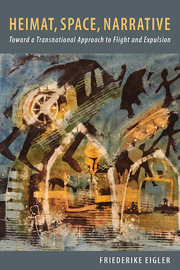Book contents
- Frontmatter
- Dedication
- Contents
- Acknowledgments
- Introduction: Geocritical Approaches to Place-Bound Belonging
- Part I Reassessing the Study of Heimat, Space, and Postwar Expulsion
- Part II Horst Bienek's Novels on Upper Silesia (1975–82)
- Part III Contemporary Novels
- Conclusion: “Lived Spaces” in Literary Narratives
- Filmography
- Works Cited
- Index
Part II - Horst Bienek's Novels on Upper Silesia (1975–82)
Published online by Cambridge University Press: 05 August 2014
- Frontmatter
- Dedication
- Contents
- Acknowledgments
- Introduction: Geocritical Approaches to Place-Bound Belonging
- Part I Reassessing the Study of Heimat, Space, and Postwar Expulsion
- Part II Horst Bienek's Novels on Upper Silesia (1975–82)
- Part III Contemporary Novels
- Conclusion: “Lived Spaces” in Literary Narratives
- Filmography
- Works Cited
- Index
Summary
Introduction: Contextualizing Flight and Expulsion in Bienek's Upper Silesia
In response to geopolitical upheaval, geographical regions assume special significance in literature and other cultural texts. One prominent example is Horst Bienek's tetralogy, which focuses on the formerly German city of Gleiwitz in Upper Silesia (today Gliwice, Poland). The four novels, published between 1975 and 1982, are Die erste Polka (The First Polka), Septemberlicht (September Light), Zeit ohne Glocken (Time without Bells), und Erde und Feuer (Earth and Fire). These Gleiwitz novels create a literary topography of a German-Polish border region that was at the center of twentieth-century political and military conflicts, epitomized in multiple border changes following the First and the Second World Wars.
Against the backdrop of some of these momentous historical events, Bienek's novels capture life on the German side of the Upper Silesian border region during and right after the Second World War. The tetralogy portrays the social fabric and German-Polish identity of this region while at the same time chronicling the forces that threaten its special multiethnic and transnational character. From a historical perspective, the four novels are thus a case study of the destructive dimension not only of National Socialism but also of nationalism and the fiction of ethnically homogenous nation-states.
- Type
- Chapter
- Information
- Heimat, Space, NarrativeToward a Transnational Approach to Flight and Expulsion, pp. 71 - 76Publisher: Boydell & BrewerPrint publication year: 2014



